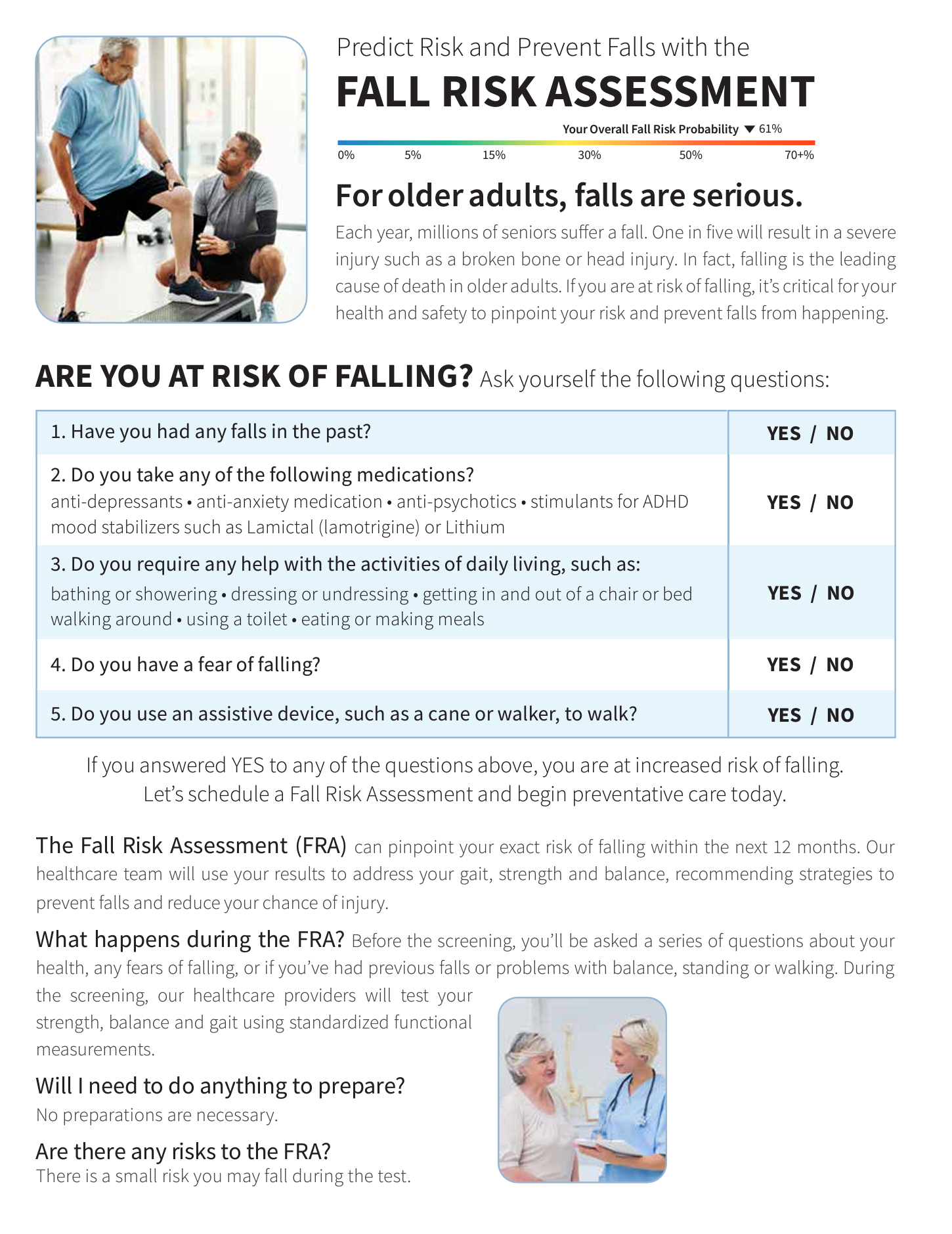The Ultimate Guide To Dementia Fall Risk
Table of ContentsSome Of Dementia Fall RiskThe Dementia Fall Risk PDFsSome Known Factual Statements About Dementia Fall Risk The Ultimate Guide To Dementia Fall RiskThe smart Trick of Dementia Fall Risk That Nobody is Talking About
In the area, inadequate road lights or vulnerable creeks and landfills may additionally cause mishaps. Falls Danger Analysis Tool (FRAT) is a 4-item falls-risk testing device for sub-acute and domestic treatment. The FRAT has 3 sections: drop risk condition, risk factor list, and activity plan. A Fall Risk Standing includes data concerning background of recent falls, medicines, emotional and cognitive status of the client.If the person scores on a danger aspect, the matching number of factors are counted to the individual's fall danger score in the box to the far. If an individual's loss threat rating amounts to 5 or higher, the person is at high risk for drops. If the patient ratings just 4 factors or lower, they are still at some danger of falling, and the nurse should use their ideal medical assessment to take care of all autumn risk factors as part of an all natural treatment strategy.
These typical techniques, in basic, assist create a safe setting that reduces unintended falls and marks core preventive procedures for all patients. Indications are vital for individuals at threat for falls.
Indicators on Dementia Fall Risk You Need To Know
Wristbands must consist of the individual's last and very first name, day of birth, and NHS number in the UK. Only red color ought to be utilized to signal special patient status.
Things that are also far may require the person to connect or ambulate needlessly and can potentially be a hazard or add to drops. Assists avoid the patient from heading out of bed with no help. Nurses reply to fallers' telephone call lights faster than they do to lights initiated by non-fallers.
Visual impairment can substantially trigger drops. Keeping the beds closer to the flooring decreases the threat of falls and severe injury. Placing the bed mattress on the floor substantially reduces autumn risk in some healthcare settings.
The 7-Minute Rule for Dementia Fall Risk
People that are tall and with weak leg muscle mass that try to sit on the bed from a standing setting are most likely to drop onto the bed due to the fact that it's too low for them to lower themselves securely. If a tall individual attempts to get up from a reduced bed without help, the individual is most likely to drop back down onto the bed or miss out on the bed and drop onto the floor.
They're created to advertise prompt rescue, not to avoid drops from bed. Distinct alarms can likewise remind the client not to get up alone. The use of alarms can also be an alternative to physical restraints. In addition to bed alarm systems, raised guidance for high-risk people additionally might assist avoid falls.

People with an evasion stride boost fall chances drastically. To decrease fall risk, footwear need to be with a little to no heel, slim soles with slip-resistant walk, and support the ankles. Suggest person to utilize nonskid socks to avoid the feet from sliding upon standing. However, urge individuals to use appropriate, well-fitting shoesnot nonskid socks for motion.
Fascination About Dementia Fall Risk
In a research, homes with adequate lighting report fewer drops (Ramulu et al., 2021). Enhancement in lights at home might reduce fall rates in older adults.

Caretakers work for guaranteeing a safe, protected, and risk-free environment. Studies showed really low-certainty evidence that caretakers minimize loss danger in intense care health centers and just moderate-certainty that options like video monitoring can lower sitter usage without you can try here enhancing fall threat, recommending that sitters are not as useful as originally believed (Greely et al., 2020).
The Buzz on Dementia Fall Risk

Enhanced physical fitness minimizes the threat for falls and restricts injury that is sustained when autumn transpires. Land and water-based exercise programs might be similarly helpful on balance and gait and consequently reduce the threat for falls. Water workout might add a positive benefit on balance and gait for females 65 years and older.
Chair Surge Exercise is a basic sit-to-stand workout that helps enhance the muscle mass in the upper legs and butts and improves mobility and freedom. The goal is to do Chair Increase workouts without using hands as the client comes to be more powerful. See sources section for a thorough direction on how to do Chair Surge workout.